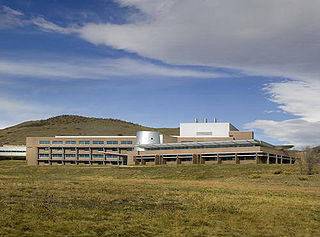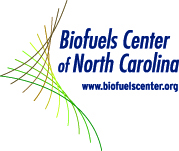
Lawrence Livermore National Laboratory (LLNL) is a federal research facility in Livermore, California, United States, founded by the University of California, Berkeley in 1952. Originally a branch of the Lawrence Berkeley National Laboratory, the Lawrence Livermore laboratory became autonomous in 1971 and was designated a national laboratory in 1981.

Lawrence Berkeley National Laboratory (LBNL), commonly referred to as Berkeley Lab, is a United States national laboratory that conducts scientific research on behalf of the Department of Energy. Located in the hills of Berkeley, California, the lab overlooks the campus of the University of California, Berkeley.

Colorado State University is a public land-grant research university in Fort Collins, Colorado. It is the flagship university of the Colorado State University System. Colorado State University is classified among "R1: Doctoral Universities – Very high research activity".

The National Renewable Energy Laboratory (NREL) specializes in the research and development of renewable energy, energy efficiency, energy systems integration, and sustainable transportation. NREL is a federally funded research and development center sponsored by the Department of Energy and operated by the Alliance for Sustainable Energy, a joint venture between MRIGlobal and Battelle. Located in Golden, Colorado, NREL is home to the National Center for Photovoltaics, the National Bioenergy Center, and the National Wind Technology Center.
The Earth Institute is a research institute at Columbia University that was established in 1995. Its stated mission is to address complex issues facing the planet and its inhabitants, with a focus on sustainable development. With an interdisciplinary approach, this includes research in climate change, geology, global health, economics, management, agriculture, ecosystems, urbanization, energy, hazards, and water. The Earth Institute's activities are guided by the idea that science and technological tools that already exist could be applied to greatly improve conditions for the world's poor, while preserving the natural systems that support life on Earth.

The U.S. Department of Energy (DOE) Joint Genome Institute (JGI), first located in Walnut Creek then Berkeley, California, was created in 1997 to unite the expertise and resources in genome mapping, DNA sequencing, technology development, and information sciences pioneered at the DOE genome centers at Lawrence Berkeley National Laboratory, Lawrence Livermore National Laboratory (LLNL) and Los Alamos National Laboratory (LANL). As a DOE Office of Science User Facility of Berkeley Lab, the JGI staff is composed of employees from Berkeley Lab, LLNL and the HudsonAlpha Institute for Biotechnology. The JGI also collaborates with other DOE-supported programs and facilities, such as the Environmental Molecular Sciences Laboratory at Pacific Northwest National Laboratory (PNNL), the National Energy Research Scientific Computing Center, or NERSC, and the DOE Bioenergy Research Centers.
Clean technology, in short cleantech, is any process, product, or service that reduces negative environmental impacts through significant energy efficiency improvements, the sustainable use of resources, or environmental protection activities. Clean technology includes a broad range of technology related to recycling, renewable energy, information technology, green transportation, electric motors, green chemistry, lighting, grey water, and more. Environmental finance is a method by which new clean technology projects that have proven that they are "additional" or "beyond business as usual" can obtain financing through the generation of carbon credits. A project that is developed with concern for climate change mitigation is also known as a carbon project.
Biofuelwatch is a non-governmental environmental organization based in the United Kingdom and the United States, which works to raise awareness of the negative impacts of industrial biofuels and bioenergy, on biodiversity, human rights, food sovereignty and climate change, human rights abuses, the impoverishment and dispossession of local populations, water and soil degradation, loss of food sovereignty and loss of food security. It opposes the expansion of industrial monocultures driven by demand for bioenergy, and instead advocates for food sovereignty, agroecological farming practices, ecosystem and biodiversity protection and human rights.

Algae fuel, algal biofuel, or algal oil is an alternative to liquid fossil fuels that uses algae as its source of energy-rich oils. Also, algae fuels are an alternative to commonly known biofuel sources, such as corn and sugarcane. When made from seaweed (macroalgae) it can be known as seaweed fuel or seaweed oil.

Food versus fuel is the dilemma regarding the risk of diverting farmland or crops for biofuels production to the detriment of the food supply. The biofuel and food price debate involves wide-ranging views, and is a long-standing, controversial one in the literature. There is disagreement about the significance of the issue, what is causing it, and what can or should be done to remedy the situation. This complexity and uncertainty is due to the large number of impacts and feedback loops that can positively or negatively affect the price system. Moreover, the relative strengths of these positive and negative impacts vary in the short and long terms, and involve delayed effects. The academic side of the debate is also blurred by the use of different economic models and competing forms of statistical analysis.
Patrick Kenji Takahashi is an American biochemical engineer and popular science writer. He has published more than a hundred scientific papers and written four books. He is director emeritus of the Hawaii Natural Energy Institute at the University of Hawaii.

Sustainable biofuel is biofuel produced in a sustainable manner. It is not based on petroleum or other fossil fuels. It includes not using plants that are used for food stuff to produce the fuel thus disrupting the worlds food supply.

Cellana, Inc. is an American company which develops of algae-based bioproducts for high-value nutrition, ink, and bioenergy applications, including Omega-3 nutraceutical applications, sustainable ink, aquaculture and animal feeds, human food ingredients, pigments, specialty chemicals, and biofuels. The company, with offices in Hawaii and San Diego, has received multiple multimillion-dollar grants from the United States Department of Energy and United States Department of Agriculture.
Envirofit International is an American non-profit organization that develops technology for reducing air pollution and enhancing energy efficiency in developing nations.
There are various social, economic, environmental and technical issues with biofuel production and use, which have been discussed in the popular media and scientific journals. These include: the effect of moderating oil prices, the "food vs fuel" debate, poverty reduction potential, carbon emissions levels, sustainable biofuel production, deforestation and soil erosion, loss of biodiversity, effect on water resources, the possible modifications necessary to run the engine on biofuel, as well as energy balance and efficiency. The International Resource Panel, which provides independent scientific assessments and expert advice on a variety of resource-related themes, assessed the issues relating to biofuel use in its first report Towards sustainable production and use of resources: Assessing Biofuels. In it, it outlined the wider and interrelated factors that need to be considered when deciding on the relative merits of pursuing one biofuel over another. It concluded that not all biofuels perform equally in terms of their effect on climate, energy security and ecosystems, and suggested that environmental and social effects need to be assessed throughout the entire life-cycle.
Maurice Lee "Maury" "Quickshot" Albertson, PhD, civil engineer, a teacher of water resources management over a long career at Colorado State University in Fort Collins, Colorado and former head of the Colorado State University Research Foundation.
ARPA-E, or Advanced Research Projects Agency–Energy is a United States government agency tasked with promoting and funding research and development of advanced energy technologies. It is modeled after the Defense Advanced Research Projects Agency (DARPA).

The Biofuels Center of North Carolina is a private, nonprofit corporate facility located on a 426-acre (1.72 km2) Biofuels Campus in Oxford, North Carolina. The Center is funded by the North Carolina General Assembly to implement North Carolina's Strategic Plan for Biofuels Leadership and to reduce the state's dependence on imported liquid fuel. The Center's mission is to develop a sustainable, statewide biofuels industry to reduce this dependence, create jobs and opportunities for prosperity for North Carolinians. The strategic goal: by 2017, 10% of North Carolina's liquid fuels—or about 600 million US gallons (2,300,000 m3) a year—will be produced in-state from locally grown biomass.
The Engines and Energy Conversion Laboratory (EECL) is a research/education program housed in the Department of Mechanical Engineering at Colorado State University (CSU).
RASEI is a joint institute between the University of Colorado Boulder (CU-Boulder) and the National Renewable Energy Laboratory (NREL) addressing important, complex problems in energy that require a multidisciplinary, multi-institutional approach.









